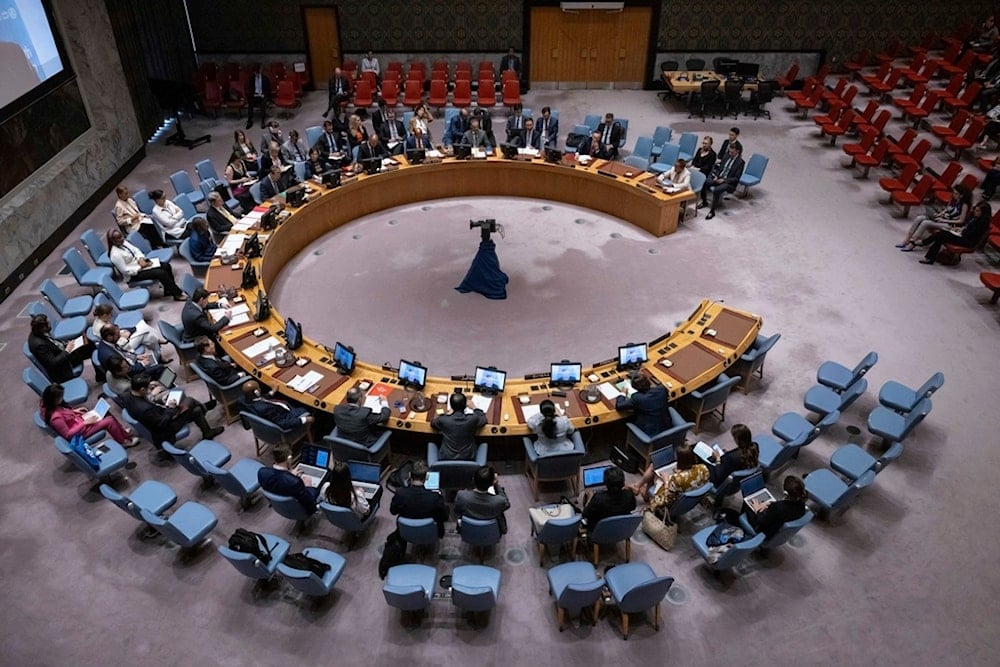US to back UN Security Council reform to advance strategic interests
The United States is pushing for the creation of new Security Council seats for African and Pacific Island nations, aiming to repair strained relations and counter global power shifts, while maintaining its opposition to extending veto powers.
-

A general view shows the UN Security Council meeting at United Nations headquarters, Thursday, August 29, 2024. (AP)
In an effort to repair strained relations with African nations and strengthen ties with Pacific Island countries, the United States has proposed a significant diplomatic gesture. The US is backing the creation of two permanent United Nations Security Council seats for African states, along with a rotating seat for small island developing states of the Pacific Islands.
This move comes amid growing discontent in Africa over Washington’s support of the Israeli occupation's genocidal war on the Gaza Strip, and as the US looks to bolster its influence in the Pacific while attempting to balance global power shifts in favor of China.
According to the US ambassador to the UN, Linda Thomas-Greenfield, the US is set to make the announcement on Thursday and "move this agenda forward in a way that we can achieve Security Council reform at some point in the future."
Thomas-Greenfield described this move as part of US President Joe Biden's legacy but ahead of the upcoming announcement at the Council on Foreign Relations in New York, the ambassador clarified in an interview with Reuters that Washington opposes extending veto power to any new members.
The UN Security Council, originally comprised of 11 members at its founding in 1945, was expanded to 15 in 1965. Today, it includes 10 elected nations serving two-year terms and five permanent members with veto power: the US, the UK, France, Russia, and China.
UNSC reform will take time
"You have a Security Council that corresponds exactly to the situation after the Second World War ... that has a problem of legitimacy, and that has a problem of effectiveness, and it needs to be reformed," UN Secretary-General Antonio Guterres, who backs Security Council reform, told Reuters on Wednesday.
Changes to Security Council membership require amending the UN Charter, which must be approved by two-thirds of the General Assembly and the five current veto powers. While the 193-member General Assembly has debated Security Council reform for over a decade, recent geopolitical tensions have increased calls for change, as rivalries have often paralyzed the council.
In her interview, Thomas-Greenfield told Reuters she was unsure how long it would take to bring such a resolution to a vote in the General Assembly.
The assembly elects five new members annually from various regional groups to serve two-year terms on the Security Council. At present, three seats are allocated to African nations on a rotational basis.
In her upcoming speech, Thomas-Greenfield is expected to acknowledge that "much of the discussion around Security Council reform has remained just that: a discussion."
According to prepared remarks reviewed by Reuters, she will announce that the US supports moving forward with negotiations on a draft text to amend the UN Charter to expand the council.
Thomas-Greenfield is set to argue that these non-permanent seats do not fully empower African countries to contribute their knowledge and leadership to the council, particularly on issues that disproportionately affect Africa.
Additionally, the ambassador will emphasize that small island developing states should have a rotating seat, given their valuable perspectives on global peace and security challenges, including the effects of climate change.
Read more: Arab League to move forward with freezing 'Israel's' UNGA membership

 3 Min Read
3 Min Read










